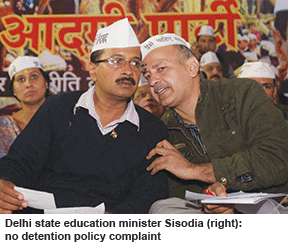Five years after the historic Right to Free and Compulsory Education (RTE) Act, 2009 which makes it mandatory for the State to provide free and compulsory elementary (class I-VIII) education to all children between 6-14 years of age became operational on April 1, 2010, several provisions of this hastily drafted law continue to attract controversy.
 Initially, the provision which attracted severe criticism was s.12 (1) (c) of the Act that made it mandatory for all private schools to provide free and compulsory admission to poor children from their neighbourhoods to the extent of 25 percent of capacity in class I every year and retain them upto class VIII. After massive protest and much litigation, in 2012 the Supreme Court upheld the constitutional validity of s.12 (1) (c) but excluded “minority institutions” and boarding schools, which has generated considerable definitional controversies.
Initially, the provision which attracted severe criticism was s.12 (1) (c) of the Act that made it mandatory for all private schools to provide free and compulsory admission to poor children from their neighbourhoods to the extent of 25 percent of capacity in class I every year and retain them upto class VIII. After massive protest and much litigation, in 2012 the Supreme Court upheld the constitutional validity of s.12 (1) (c) but excluded “minority institutions” and boarding schools, which has generated considerable definitional controversies.
More recently, s.19 and the Schedule of the RTE Act, which mandate minimal infrastructure, teacher-pupil ratio, and other norms for all private schools on pain of closure and heavy penalties, have aroused the wrath of private schools which educate over half the country’s school-going children. In particular, the future of over 300,000 ‘unrecognised’ private budget schools, which reportedly host a mind-boggling 60 million children who have fled the country’s 1.20 million dysfunctional government primary-secondaries characterised by chronic teacher truancy and rock-bottom learning outcomes, is endangered.
Now the latest dissatisfaction is with s.16 of the Act which stipulates that “no child admitted in a school shall be held back in any class or expelled from school until completion of elementary education”.
At a March 21 meeting of state education ministers held in New Delhi to discuss the BJP-NDA government’s proposed New Education Policy, there was a loud clamour for “review” i.e. removal of s.16 which is being faulted for rising student absenteeism, negligent teaching, falling learning outcomes and inability of students to cope with studies and examinations beyond class VIII.
Although the issue of no-detention has ballooned recently, there have always been misgivings about this provision of the RTE Act.
The subject was raised in a meeting of the Central Advisory Board of Education (CABE) in June 2012 by several states.
Subsequently, a CABE sub-committee headed by then Haryana education minister Geetal Bhukkal recommended a review of s.16.
Manish Sisodia, Delhi’s education minister and deputy chief of the Aam Aadmi Party (AAP) which swept the state legislative election of February 7 winning 67 of the 70 seats in the assembly, is in favour of review — albeit partial — of s.16.
“Implementation of the no-detention policy without any prior preparation has turned out to be a major problem and students are reaching higher classes without proper understanding, and are encountering severe problems in coping with the tough syllabus,” he wrote in a letter to Union HRD minister Smriti Irani.
Sisodia suggests no detention until class III. However the governments of BJP-ruled states — Rajasthan, Madhya Pradesh, Chhattisgarh, Goa — have unreservedly called for deletion of s.16. The main argument of state education ministers is that automatic promotion is a disincentive for students to learn and primary teachers to teach. Moreover, automatic promotions in elementary education result in a large cohort of over 100 million under-prepared children entering high school (class IX), putting pressure on teachers and school managements to dilute academic standards.
“The plain truth is that millions of duffers and illiterates are landing up in high schools and dragging everybody down,” says a Delhi-based private school principal, who preferred to remain anonymous.
Add another debatable issue to the growing list of controversies generated by the hastily drafted RTE Act.
Autar Nehru (Delhi)


























